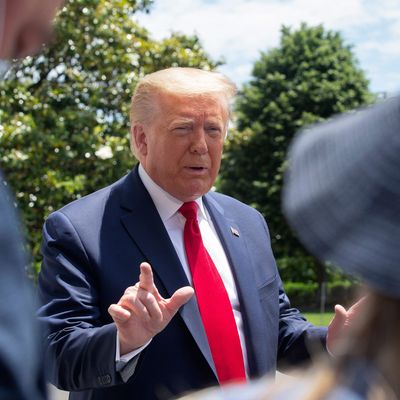
Six months ago, the core message of Donald Trump’s reelection campaign was clear, simple, and hard to refute: You are (probably) better off now than you were four years ago.
In January, America’s unemployment rate was lower than it had been since 1969. Among African-Americans and Latinos, joblessness was near all-time lows. The upper middle class’s 401(k)s were rapidly appreciating — while low-income workers’ wages were gradually rising. The deal artist-in-chief might be uncouth. His dealings in the Donbass may have been a bit shady. But clearly, the man was an economic genius, just as the documentary The Apprentice had led millions of Americans to believe.
As one leading Democratic strategist said of Donald Trump’s economic message last year, “You may agree or not with it, but you know what it is. And Democrats, you don’t know what it is. And that’s a recipe for disaster in 2020.”
The Trump campaign layered several supplementary arguments atop this foundational appeal. To broaden the president’s support among Black voters, it broadcast his bonafides as a criminal-justice reformer, spotlighting the First Step Act in Trump’s State of the Union Address and a Super Bowl commercial. To keep immigration salient to xenophobic white swing voters, Trump touted the supposed threat of mass migration at our southern border, which only his administration’s hard-line policies could keep in check. And to prevent culturally left-leaning suburbanites from defecting to blue America, the president warned that the opposition party had modeled its economic agenda on Nicolás Maduro’s.
Alas, these messages ended up having a short shelf life.
The COVID-19 crisis has, of course, invalidated Trump’s economic triumphalism. And it’s done similarly obvious damage to the president’s promise to “keep America safe.” But recent events have also spoiled the president’s supplementary appeals.
True, the pandemic has been somewhat conducive to Trump’s closed borders, anti-Chinese nationalism. But it has also served to lower the salience of immigration. At the U.S. southern border, there’s no longer any molehill for the president to rebrand as a mountain. Although it’s been a failure in every other respect, the president’s handling of the coronavirus has successfully deterred migration; turns out, letting your country become a bastion of infectious disease and unemployment is an effective means of reducing the number of foreigners who want to come there. Last month, the number of migrants apprehended at the U.S. southern border was 83 percent lower than in May 2019. In a context where immigration inflows are almost nonexistent — and tens of millions of Americans recently lost their jobs and health insurance — it will not be easy for Trump to turn unlawful immigration into a top-tier campaign issue (especially when his administration is going out of its way to increase the salience of its horrendously unpopular stance on health-care policy). Meanwhile, the Democrats’ coronation of an elderly white man — with a half-century of experience in placating mildly racist moderate voters — has rendered Trump’s “red scare” strategy nonviable.
Trump’s gestural appeals to African-Americans have been similarly ill-fated. As of February, there was some evidence that the president was actually making headway with Black voters. But once the era of record-low Black unemployment gave way to 1) an economic and epidemiological crisis that has afflicted African-Americans with grotesque disproportionality and 2) the largest anti-racist protests in recent memory, Trump’s inroads with the African-American community have turned into dead ends. Although the president has lost more support among white voters than among nonwhite voters in recent months, he’s ceased gaining ground with the latter. And while his campaign might wish otherwise, the Black Lives Matter protests have caused Trump to forget that he heroically opposes excessively long prison sentences.
All this puts the president in a tough spot. Handling a public-health emergency with an order of magnitude less success than the leaders of every other developed nation — thereby plunging your economy into deep recession — probably isn’t a problem that good messaging can solve. But it also seems safe to say that the president’s current messaging is less than optimal.
The problem isn’t merely that Trump can’t seem to stop himself from sharing videos of his supporters shouting “white power.” The president’s message indiscipline and Nazi-adjacent social-media feed have long been givens. The more fundamental issue is that he has nothing coherent to say about how he intends to improve public health or revive the economy. In fact, in a recent interview with Sean Hannity, Trump proved incapable of naming a single policy that he wants to implement if he wins a second term. In recent days, the president has given the bulk of his attention to the issues of monument preservation and “cancel culture.”
For the president’s base, the defacement of a single George Washington statue might seem like a matter of urgent national concern. After all, for many cultural conservatives, such vandalism is a stand-in for a broader transformation of American civic identity that their movement exists to beat back. But it is hard to fathom how a relentlessly statue-themed campaign message is supposed to appeal to the median American. How many single-issue “anti-statuary vandalism” voters could there possibly be? Who, precisely, is thinking to themselves, I have deep concerns about the way Donald Trump has handed this pandemic (which has made my life worse in almost every respect), but now that I’ve learned that leftist activists sprayed paint on a monument to George Washington, I can’t in good conscience vote for Joe Biden (who has himself called for the “protection” of monuments to our founders)? Is there really a critical mass of white working-class swing voters in Wisconsin who were so perturbed by James Bennet’s ouster at the Times, they now intend to give their ballots to whichever candidate takes the strongest stand against cancel culture?
To be fair, pro-monument demagogy is probably more electorally promising than many of Trump’s other messages over the past 48 hours, which have included, “The intelligence about Russian efforts to kill U.S. soldiers in Afghanistan that I ignored was inconclusive,” and, “I am so alone.”
Trump has always had a tendency to narrowcast to his fellow Fox News addicts and to see the bully pulpit as a platform for communicating his self-pity. Before the coronavirus crisis, however, the president could let the economy make his case for him. Now he can’t.






























